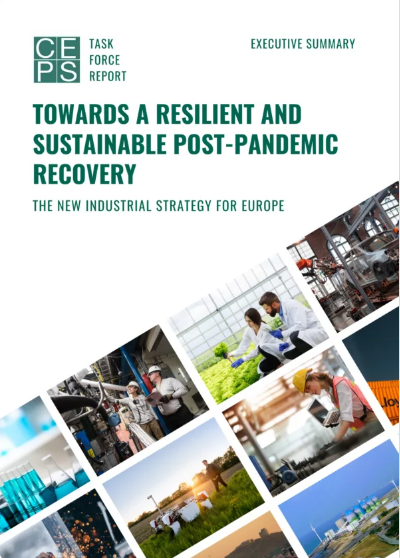
The Centre for European Policy Studies (CEPS) is an independent policy research institute based in Brussels. Its mission is to produce sound analytical research leading to constructive solutions to the challenges facing Europe today.
Faced with the prospect of a long-lasting and traumatic pandemic, CEPS decided to step up its efforts to support the work of EU institutions in the development of an industrial strategy fit for a brighter future.
CEPS started to advertise an ambitious work programme in early summer 2020, and officially launched the Task Force ‘Towards a resilient and sustainable post-pandemic recovery’ on 26 November 2020. Eight working groups were created, tasked with exploring policy recommendations. The Task Force was a truly multi-stakeholder initiative including a balanced participation from various stakeholders including NGOs.
Euroseeds had the opportunity to engage in discussions with the CEPS Task Force working group on AGRICULTURE AND FOOD – SCIENCE AND TECHNOLOGY: OPPORTUNITIES FOR AND RESISTANCE TO CHANGE including Tassos Haniotis, Director “Strategy, Simplification and Policy Analysis”, DG AGRI, European Commission; Petra Jorasch, Manager Plant Breeding Innovation Advocacy, Euroseeds; Urs Niggli, President, agroecology.science; Riccardo Valentini, Professor, University of Tuscia, Italy; Justus Wesseler, Professor, Wageningen University & Research, Netherlands and Erika Widegren, Chief Executive, Re-Imagine Europa. The outcome of these discussions were now published in a report which includes some recommendations for post pandemic policy making.
The report states that advanced plant-breeding techniques can also help tackle sustainability issues and contribute to the transformation in agri-food systems. The new techniques, for instance, make use of genome editing for crop improvement and may further support sustainable agricultural productivity.
In this case as well, these new techniques also generate important debates on major regulatory aspects (GMO-like controversy). Therefore, a smart policy framework and a regulatory reform based on scientific evidence is needed to guarantee safe, advanced plant-breeding techniques and sustainable agri-food industries.
In addition, the report also highlights agroecological practices (such as crop diversification or long crop rotations) as important to support sustainable agriculture.
Throughout the coming weeks, CEPS will publish the individual reports for each of the working groups: European Green Deal, Digital transition, Strategic value chains, Jobs and Skills, Competition Policy and State Aid, Healthcare and Pharmaceuticals, Agriculture and Food, Trade Policy, and Capital Markets.
The report has been shared with the Commission, specifically members of the cabinets of President Ursula Von der Leyen, Commissioner Thierry Breton and Vice-President Maroš Šefčovič. The individual reports will be shared with all relevant cabinets.
Following the publication of all the individual reports, CEPS will have a follow-up event in the autumn to further discuss and look deeper into the technicalities of our recommendations.